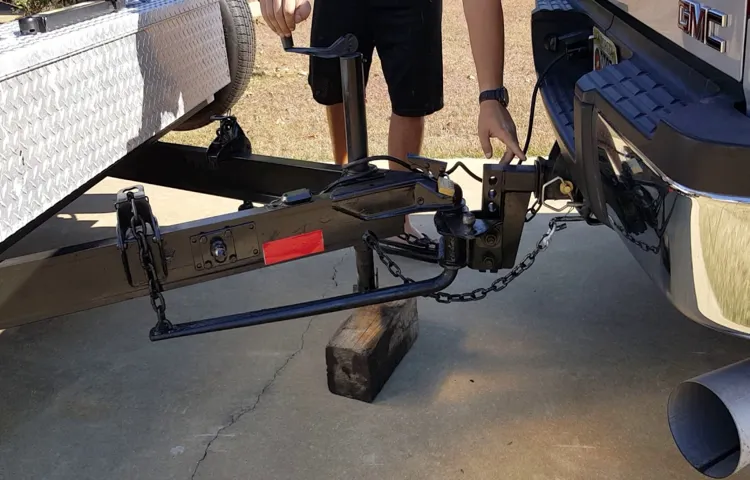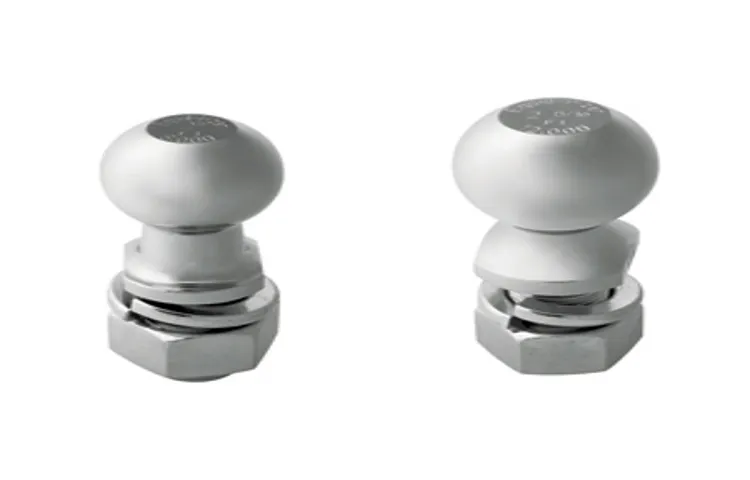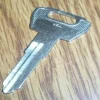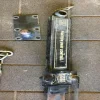Are you wondering how to choose the right ball for your equalizer hitch? Look no further, because in this blog post, we will guide you through all the factors to consider when making this important decision. Just like picking the right tool for a specific job, selecting the correct ball for your equalizer hitch is crucial for safe and efficient towing. Think of your equalizer hitch as a trusty sidekick, helping you maintain stability and control while towing heavy loads.
And just like a sidekick, it needs the right equipment to be effective. The ball you choose plays a significant role in ensuring a secure and smooth towing experience. One of the key factors to consider when selecting a ball for your equalizer hitch is the weight rating.
Matching the weight rating of the ball to the maximum towing capacity of your hitch is essential for safe towing. Using a ball with a weight rating that is too low can lead to structural damage and compromise your safety on the road. Another essential aspect to consider is the ball size.
Most equalizer hitches require a specific ball size, typically 2 inches or 2 5/16 inches. Using the wrong ball size can result in improper attachment and compromised stability when towing. It’s crucial to check your hitch’s specifications or consult the manufacturer to ensure you choose the correct ball size.
Additionally, you’ll want to consider the type of trailer you’ll be towing. Different trailers may require different types of balls, such as standard or adjustable balls. Adjustable balls offer the flexibility to accommodate different towing setups, making them a popular choice for those who tow various trailers.
Lastly, don’t forget to consider the material and quality of the ball. Opting for a high-quality, durable ball made from strong materials, such as chrome-plated steel, will ensure longevity and reliability. By taking into account these factors, you can confidently choose the right ball for your equalizer hitch, knowing that you’ve made a safe and informed decision.
Table of Contents
Understanding the Equalizer Hitch System
So you’ve decided to invest in an Equalizer Hitch System to make towing your trailer a breeze. But now you’re wondering, what kind of ball do you need for this hitch system? Well, the answer is fairly simple. When it comes to an Equalizer Hitch, you’ll need a specific type of ball known as a shank-style ball.
The shank-style ball has a longer neck that allows it to fit properly into the hitch head of the Equalizer system. This ensures a secure and stable connection between your towing vehicle and trailer. So, when you’re shopping for a new ball for your Equalizer Hitch, make sure to look for one that is specifically designed for use with this type of system.
And remember, it’s always a good idea to double-check with the manufacturer or a trusted expert to ensure you’re getting the right ball for your hitch. Happy towing!
What is an Equalizer Hitch?
equalizer hitch An equalizer hitch is a crucial piece of equipment for towing heavy loads with your vehicle. It is designed to distribute the weight of your trailer evenly across all four wheels of your tow vehicle, ensuring a safer and more stable towing experience. When you attach a trailer to your vehicle, it adds significant weight to the rear of your vehicle, which can cause the front of your vehicle to lift off the ground and reduce steering and braking control.
This is called trailer sway or fishtailing, and it can be very dangerous if not properly managed. An equalizer hitch works by using tensioned bars that connect the trailer’s tongue to the tow vehicle’s frame. These bars create upward pressure on the rear axle of the tow vehicle, transferring some of the weight from the rear axle to the front axle.
This helps to level out the vehicle and distribute the weight more evenly, reducing trailer sway and improving overall control. In addition to preventing trailer sway, an equalizer hitch also helps to reduce the stress on your vehicle’s suspension and tires, making for a smoother and more comfortable ride. So if you’re planning on towing a heavy load, investing in an equalizer hitch is a smart choice for both safety and peace of mind.

How Does an Equalizer Hitch Work?
equalizer hitch, weight distribution hitch, trailer towing, sway control, load distribution, tow vehicle, safety, stability, towing capacity, towing system, distribution bars, friction sway control, weight distribution hitch system, tow vehicle’s hitch, tow vehicle and trailer. An equalizer hitch, also known as a weight distribution hitch, is an essential component for safe and stable trailer towing. When you’re towing a heavy load, the weight of the trailer can cause the rear of your tow vehicle to sag, affecting its handling and braking capabilities.
An equalizer hitch is designed to distribute the weight of the trailer more evenly across the tow vehicle, ensuring a level ride and reducing the risk of trailer sway. The equalizer hitch system consists of three main components: the distribution bars, the hitch head, and the sway control. The distribution bars connect the hitch head to the tow vehicle’s hitch receiver and are responsible for transferring the weight of the trailer to the front axle of the tow vehicle and the trailer’s axles.
This load distribution helps to improve the stability and handling of the entire towing system. The hitch head is attached to the tow vehicle’s hitch receiver and provides a secure attachment point for the distribution bars. It has built-in spring arms that apply tension to the distribution bars, allowing them to transfer the weight evenly.
The tension can be adjusted to suit the specific towing capacity and load distribution requirements. Sway control is an additional feature that can be included in an equalizer hitch system to further enhance stability. It works by reducing trailer sway caused by external factors like winds or passing vehicles.
Sway control can be achieved through various methods, including friction sway control, which uses friction between the distribution bars and the hitch head to resist trailer movement. Overall, an equalizer hitch is a vital tool for maintaining safety and stability while towing heavy loads. It ensures that your tow vehicle and trailer are properly balanced, reducing strain on the tow vehicle and improving the overall towing experience.
So, if you’re planning on towing a trailer, make sure to invest in a reliable equalizer hitch system to keep your towing adventures safe and worry-free.
Factors to Consider when Selecting a Ball
When selecting a ball for an equalizer hitch, there are a few factors to consider. First and foremost, you need to ensure that the ball is rated for the weight of your trailer. This means taking into account the trailer’s maximum gross weight and choosing a ball that can safely handle that load.
Additionally, you’ll want to consider the size of the ball. Most equalizer hitches require a 2-inch or 2 5/16-inch ball, so make sure to check the specific requirements of your hitch. Another important factor is the quality of the ball.
Look for a ball that is made from high-quality materials and has been tested for durability. Finally, consider the type of ball mount you will be using. Some hitches require a specific type of mount, so be sure to choose a ball that is compatible with your setup.
By carefully considering these factors, you can ensure that you select the right ball for your equalizer hitch and enjoy a safe and smooth towing experience.
Weight Capacity
weight capacity, factors to consider, selecting a ball When it comes to selecting a ball for a specific purpose, one important factor to consider is its weight capacity. The weight capacity refers to the maximum weight that a ball can support without compromising its performance or posing a safety risk. This is particularly important in sports or recreational activities where the ball needs to withstand the impact of players or equipment.
For example, in basketball, a ball with a low weight capacity may deflate or lose its shape when repeatedly dribbled or subjected to forceful shots. On the other hand, a ball with a high weight capacity can handle the stress and maintain its shape and bounce. To determine the weight capacity of a ball, manufacturers often provide specifications or guidelines, which should be carefully reviewed before making a purchase.
Additionally, it is crucial to consider the intended use of the ball and the weight it will be subjected to. Whether it’s for competitive play or casual use, selecting a ball with the appropriate weight capacity is essential for a satisfying and safe experience.
Ball Size
ball size, selecting a ball, factors to consider, sports equipment, appropriate size, sport-specific, player’s age, physical characteristics, skill level, comfort, control, performance Paragraph: When it comes to selecting a ball for any sport, the size is a crucial factor to consider. The appropriate ball size can greatly impact a player’s performance and overall experience. It is important to choose a ball that is sport-specific and tailored to the player’s age, physical characteristics, and skill level.
For younger players, a smaller ball size is typically recommended as it is easier to handle and control. As players grow older and develop their skills, they may need to transition to a larger ball size to accommodate their increased strength and ability. It is also essential to consider the comfort level of the player.
A ball that is too big or too small may not feel comfortable in the player’s hands, affecting their grip and control. Ultimately, finding the right ball size can enhance the player’s performance and provide an enjoyable and rewarding sporting experience. So, next time you’re selecting a ball, make sure to consider the factors of size, player’s age, physical characteristics, skill level, comfort, control, and overall performance.
Determining the Ball Size for Your Equalizer Hitch
Choosing the right ball size for your Equalizer hitch is crucial for a safe and efficient towing experience. The size of the ball depends on the weight rating of your hitch and the trailer you are towing. Generally, Equalizer hitches come with a 2-inch or a 2-5/16-inch ball size.
To determine the correct ball size, you can refer to the owner’s manual for your trailer or hitch, which should provide specific instructions. If you don’t have the manual, you can also measure the diameter of the coupler on your trailer. A 2-inch coupler requires a 2-inch ball, while a 2-5/16-inch coupler requires a 2-5/16-inch ball.
It’s essential to match the ball size exactly to the coupler size to ensure a secure connection. Using the wrong ball size can lead to towing issues, such as excessive swaying or even detachment of the trailer. So, always double-check the ball size before hitting the road.
Check the Manual or Manufacturer’s Instructions
equalizer hitch, ball size, manual, manufacturer’s instructions Determining the correct ball size for your equalizer hitch is an essential step in ensuring a safe and stable towing experience. While there are a few factors to consider, the best place to start is by checking the manual or manufacturer’s instructions for your specific equalizer hitch. These documents are designed to provide you with all the information you need to properly set up and use your hitch, including the recommended ball size.
The manual or instructions will typically outline the appropriate ball size based on the weight of your trailer or the tongue weight. They may also provide guidelines for different towing scenarios, such as if you plan to tow multiple trailers or if you need to adjust the ball size for a different towing vehicle. By consulting the manual or manufacturer’s instructions, you can ensure that you are using the correct ball size for your equalizer hitch.
This is crucial because using the wrong size can lead to instability, excessive sway, or even a complete trailer detachment while on the road. In addition to the recommended ball size, the manual or instructions may also provide guidance on other factors to consider when setting up your equalizer hitch. This could include the proper hitch height, weight distribution adjustments, or other features that can help optimize the performance of your towing setup.
Remember, the manual or manufacturer’s instructions are there for a reason. They are designed to provide you with the necessary information and guidelines to ensure a safe and successful towing experience. So, before you hit the road, take the time to check the manual or instructions and confirm that you have the correct ball size for your equalizer hitch.
Measure the Coupler Size
equalizer hitch, ball size, coupler size Determining the correct ball size for your equalizer hitch is an important step in ensuring a safe and smooth towing experience. The ball size refers to the diameter of the hitch ball that fits into the coupler on your trailer. It is crucial to get this measurement right as it directly affects the compatibility and stability of your towing setup.
To measure the coupler size, you will need a measuring tape or ruler. Start by locating the coupler on your trailer. This is the part that connects to the hitch ball.
The coupler will have a socket where the hitch ball fits into. Measure the inside diameter of this socket. Most couplers come in standard sizes such as 2 inches or 2-5/16 inches.
However, it’s always a good idea to double-check the size to ensure accuracy. Some trailers may have a non-standard size, and it’s important to find a hitch ball that matches it exactly. Once you have determined the coupler size, you can select the appropriate hitch ball.
The ball size should match the coupler size. For example, if your coupler has a 2-inch inside diameter, you will need a 2-inch hitch ball. If the coupler size is 2-5/16 inches, you will need a hitch ball of the same size.
Using the correct ball size is essential for safe towing. It ensures that the hitch ball and coupler fit together securely and minimizes the risk of any accidents or damage while on the road. It is always recommended to consult your trailer’s manufacturer or a professional for guidance if you are unsure about the ball size or have any concerns about your towing setup.
Consider the Gross Trailer Weight
When it comes to towing large trailers, an equalizer hitch is a must-have to provide stability and control. But determining the right ball size for your equalizer hitch can be a bit confusing. One important factor to consider is the gross trailer weight.
This refers to the total weight of the trailer, including everything on it, such as cargo and accessories. It’s crucial to know the gross trailer weight because different ball sizes have different weight capacities. Using the wrong ball size can lead to a disaster on the road, as the hitch may not be able to support the weight of the trailer properly.
So, before you head out on the road, be sure to weigh your trailer and factor in all the payload to determine the correct ball size for your equalizer hitch. By doing so, you can ensure a safe and smooth towing experience.
Consider the Tongue Weight
equalizer hitch. When it comes to towing a trailer, one of the most important factors to consider is the tongue weight. The tongue weight refers to the amount of weight exerted by the trailer on the hitch ball.
It is crucial to ensure that the tongue weight is within the recommended range for your specific equalizer hitch. If the tongue weight is too high, it can cause the front of your tow vehicle to be lifted, affecting your steering and braking capabilities. On the other hand, if the tongue weight is too low, it can cause instability and swaying of the trailer.
To determine the ball size for your equalizer hitch, you need to know the tongue weight of your trailer. This can be done by using a tongue weight scale or by simply weighing the tongue of the trailer using a bathroom scale and some simple math. Once you have determined the tongue weight, you can choose the appropriate ball size for your equalizer hitch.
It is important to select a ball size that matches the tongue weight of your trailer to ensure safe and secure towing. So next time you hitch up your trailer, don’t forget to consider the tongue weight and choose the right ball size for your equalizer hitch.
Popular Ball Options for Equalizer Hitches
When it comes to selecting a ball for an equalizer hitch, there are a few popular options to consider. The most common ball size is 2 inches, but it’s always a good idea to check your trailer’s specifications to make sure you choose the correct size. Another important aspect to consider is the weight rating of the ball.
Equalizer hitches typically come with a maximum weight rating, so you’ll want to choose a ball that matches or exceeds that rating. Additionally, some trailer manufacturers recommend using a specific type of ball, such as a chrome-plated or heat-treated ball, to ensure the best performance and durability. Ultimately, the best ball for your equalizer hitch will depend on the specific needs of your trailer and towing setup, so it’s always a good idea to consult the instruction manual or a knowledgeable professional for guidance.
2 5/16-inch Ball
2 5/16-inch ball, equalizer hitches, popular ball options When it comes to towing heavy loads, having the right hitch setup is essential. One popular option for towing is the equalizer hitch, which helps distribute the weight evenly between the trailer and the towing vehicle. And to ensure a secure connection, you need the right size ball.
That’s where the 2 5/16-inch ball comes in. This ball size is commonly used with equalizer hitches due to its versatility and strength. It can handle a wide range of towing weights, making it suitable for various types of trailers.
The 2 5/16-inch ball is a reliable choice for towing heavy loads because it provides a larger surface area for the trailer coupler to rest on. This increased contact area improves stability and reduces the risk of the trailer swaying or coming loose during transit. Additionally, the larger size of the ball allows for greater weight capacity, which means you can confidently tow larger trailers without compromising safety.
Another advantage of using a 2 5/16-inch ball with an equalizer hitch is that it offers better control and maneuverability. The larger ball size provides more leverage, allowing you to have more control over the trailer’s movements. This can be particularly beneficial when navigating sharp turns or backing up the trailer.
Overall, the 2 5/16-inch ball is a popular choice for towing with equalizer hitches due to its versatility, strength, and improved stability. Before choosing a ball size, always check the towing capacity of your hitch and trailer to ensure a proper match. It’s also important to regularly inspect your hitch setup for any signs of wear or damage to ensure safe and reliable towing.
So, next time you’re gearing up for a towing adventure, consider using a 2 5/16-inch ball with your equalizer hitch for a secure and controlled towing experience.
2-inch Ball
equalizer hitches, ball options, popular ball options, 2-inch ball In the world of towing and hauling, finding the right ball for your equalizer hitch is essential. One of the most popular options for equalizer hitches is the 2-inch ball. This versatile ball size is compatible with a wide range of trailers and offers a secure connection for hauling your load.
Plus, it’s easy to find and relatively affordable compared to other ball sizes. The 2-inch ball is commonly used for towing small to medium-sized trailers, such as utility trailers and boat trailers. It has a weight rating of up to 5,000 pounds, making it suitable for a variety of towing needs.
Whether you’re heading to the lake for a weekend of boating or tackling a DIY project, the 2-inch ball is a reliable choice for your equalizer hitch.
Conclusion
In conclusion, finding the right ball for an equalizer hitch is like searching for the perfect dance partner. You want someone who can match your moves, keep you balanced, and add a touch of elegance to the whole performance. Just like in the world of dance, the ball you choose for your hitch should be sturdy, reliable, and capable of handling your every twist and turn on the road.
So, when it comes to picking the right ball for an equalizer hitch, remember to look for a partner that can waltz with you through any terrain, smooth out your ride, and leave you feeling like the Fred or Ginger of the towing world. Happy hitching!”
FAQs
What is an Equalizer hitch?
An Equalizer hitch is a type of weight distribution hitch that helps distribute the weight of the trailer more evenly on the towing vehicle, providing a more stable and level towing experience.
How does an Equalizer hitch work?
An Equalizer hitch uses spring bars to transfer some of the trailer tongue weight to the front axle of the towing vehicle, restoring balance and improving handling and control.
Is an Equalizer hitch necessary for towing?
An Equalizer hitch is not always necessary for towing, but it is highly recommended for trailers that have a significant amount of tongue weight or if the towing vehicle and trailer combination is experiencing handling issues.
Can an Equalizer hitch be used with any type of trailer?
Yes, an Equalizer hitch can be used with various types of trailers, including travel trailers, utility trailers, and horse trailers, as long as the weights and ratings are compatible.
What kind of ball is needed for an Equalizer hitch?
An Equalizer hitch typically requires a 2-inch or 2-5/16-inch trailer ball, depending on the specific model and weight capacity of the hitch.
How do I determine the correct weight rating for an Equalizer hitch?
The weight rating of an Equalizer hitch is determined by the maximum trailer tongue weight and gross trailer weight (GTW) it can handle. It is important to choose a hitch that matches or exceeds the weight of your trailer.
Can an Equalizer hitch be adjusted to accommodate different towing setups?
Yes, most Equalizer hitches allow for adjustable settings to accommodate different trailer tongue weights and towing setups. This allows for fine-tuning the weight distribution and ensuring optimal towing performance.



